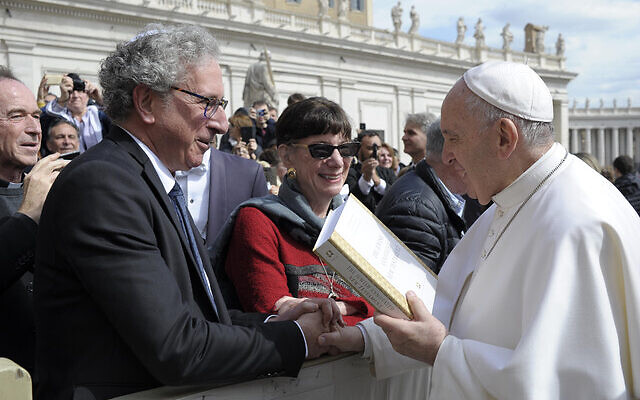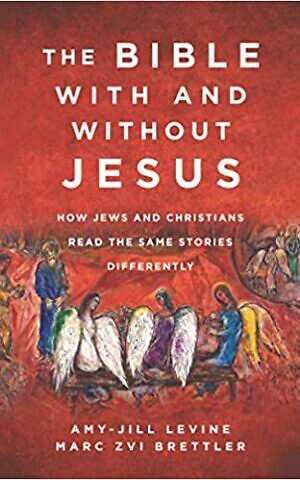For Christians, the beginning of Jesus in a manger in Bethlehem two millennia ago became no longer best chronicled within the New testomony, however additionally prophesied centuries previous in components of the Hebrew Bible. It goes with out saying that the majority Jewish readers view those passages of the ancient testomony differently.
A recently posted book, "The Bible With and with out Jesus: How Jews and Christians read the equal stories in a different way," seeks to offer some insight into how two faiths can have such disparate understandings of the identical text.
The book's two co-authors — professors Amy-Jill Levine of Vanderbilt institution and Marc Zvi Brettler of Duke school — are American Jews affiliated with Jewish experiences departments. Levine specializes in the New testomony and Brettler, who's at the moment based in Israel, makes a speciality of the Hebrew Bible. As they explained in a recent joint Zoom interview with The instances of Israel, they hope their new ebook can assist Jews and Christians be aware every other greater through inspecting how every religion interprets the identical select passages of the Hebrew Bible.
"We're now not encouraging individuals to exchange non secular beliefs," Brettler emphasised. "We're encouraging americans on each side of the divide to no longer see it as the sort of divide, however to examine these texts with someone else's lenses."
Levine and Brettler were taking part on this subject matter for a while now. In a outdated undertaking, they co-edited the "Jewish Annotated New testomony," first posted in 2011 with a second edition in 2017. a photo of the authors giving a copy of the ebook to Pope Francis in 2019 became shared generally in tutorial social media circles.

Marc Zvi Brettler, left, and Amy-Jill Levine, center-appropriate, provide a replica of their old publication, the 'Jewish Annotated New testament' to Pope Francis in March 2019. (Courtesy)
in the wake of the "Jewish Annotated New testomony," the authors persevered to observe circumstances during which Jews and Christians seem unaware of the different ways the others' faith interprets the equal constituents of the Hebrew Bible. This perception led the pair to recognize there was another ebook they necessary to write, said Levine.
Their new e-book is built around ingredients of the Hebrew Bible, or historical testomony, that Levine and Brettler identify as chiefly commonplace among Christians, starting from Adam and Eve to the term "Son of Man."
"We selected which passages would be most familiar to Christian readers from repeated use in the New testament," Levine spoke of. "We additionally wanted passages that may be the most valuable to Jewish readers unfamiliar with the brand new testament."

Amy-Jill Levine of Vanderbilt tuition, co-author of 'The Bible With and devoid of Jesus.' (Courtesy)
In each and every case, the authors appear on the textual content's interpretation in Christianity earlier than delving into its interpretations amongst Jews.
"We quote the text and what it does in its particular [New Testament] place — such because the Gospel of Matthew, of Mark, Paul's Epistle to the Romans, and so on," Levine mentioned. Then, "we dip back to detail, as most desirable as viable, how the textual content become understood in its original ancient context," as well as the way it may additionally were understood by way of later Jewish interpreters, from the lifeless Sea Scrolls, to Josephus, to medieval commentators reminiscent of prominent eleventh-century biblical linguist Rashi [Rabbi Shlomo Yitzhaki] and Moses Maimonides.
"For each chapter, we in fact had to do three different bodies of research," Brettler talked about. "What the biblical text at the beginning meant, what it supposed in Christianity, and what it meant within Judaism." He stated that "Jewish interpretation, in conventional, turned into a lot greater diffuse than Christian interpretation. loads of selections were hard to make about which materials of Jewish interpretation to stress and consist of more than others."
simply who was Jesus, anyway?Joel Marcus, an emeritus professor of new testament and Christian origins at Duke Divinity school and a colleague of Brettler's, defined that disputes over Jesus's ancient function ended in differing interpretations of the Hebrew Bible between Jews and Christians.
Marcus referred to that "the earliest Christians had been Jews," but "most Jews finally decided that Jesus was not the messiah, and controversy arose between Jews and Christians around the interpretation of many ingredients of Scripture."

Joel Marcus, emeritus professor of new testament and Christian origins at Duke Divinity faculty. (Courtesy)
for example, the e-book of Isaiah from Chapter forty onward is mentioned in "The Bible With and with out Jesus." Centuries after Jesus's dying, the time period "suffering servant" become coined among early Christians to infuse these passages with a Christian interpretation that they foretell Jesus.
These passages in Isaiah characteristic "a mysterious determine known as the Servant," Marcus spoke of. "occasionally it seems pretty clear Israel itself is the servant. sometimes the servant looks to be an individual determine. on occasion it looks to have a collective nature." basic, he talked about, "the id of the determine looks to oscillate between a person and a collective reference."
"I think maybe early Christians observed that," Marcus spoke of. "It helped them of their relating those sections to Jesus, who in Christian knowing is an individual determine and also a figure with a collective dimension."
"For Jesus's followers, relatively much every thing in Israel's Scriptures pointed to him," Levine mentioned. "consequently the textual content got here to have a unique that means."

'The Bible With and with out Jesus,' through Amy-Jill Levine and Marc Zvi Brettler. (Courtesy)
Early Christians started reinterpreting other materials of the Hebrew Bible via a Christ-founded lens. They found prophecies of the Nativity narrative in one of the vital texts examined by using Levine and Brettler, equivalent to other constituents of Isaiah and the e-book of Jeremiah.
Levine holds that such texts can "add to the regularly occurring Christmas story," taking it past the contemporary figuring out of "Santa Claus, a Christmas tree, presents, whatever a couple of baby." She sees the Bethlehem narrative as "now not just a sweet story a few boy left in a manger, a bunch of smart people, people from the East, with frankincense and myrrh," but one with "old context within the Roman Empire, children in hazard, political oppression, forced emigration, the plight of the immigrants, overseas relations, economics, politics, echoes of Israel's historical past, a stunningly profound story."
The Gospel of Matthew links Jesus's virgin delivery to prophecies in Isaiah, and of Herod's slaughter of the innocents in Jeremiah. Yet, Levine referred to, the customary Hebrew phrases in Isaiah supposed a younger lady who is pregnant, now not a virgin who will develop into pregnant, while Jeremiah 31 is about Rachel weeping for her children, "no greater."
"Matthew glosses over how some of those [Old Testament] people functioned in their fashioned context," Levine mentioned. "Our understanding of Matthew turns into improved with the aid of our realizing of put up-biblical Judaism… The greater you know about how texts were read in antiquity, the more potent your potential of your own sacred scripture will turn into."
walking in a mine fieldLevine and Brettler admire that the terrain they're venturing upon has been fraught for an awful lot of background. They reference polemics by means of Jews and Christians by which the authors condemn the lack of ability of the other faith to see things their manner.
"part of the fundamental concern is that we tend via heritage to be 'either-or,' now not 'both-and,'" Levine spoke of. "'If Christians are appropriate, Jews must be wrong, and vice-versa. Christians claim that Jews fail to notice Jesus of their own scriptures. Paul speaks in 2 Corinthians of Jews studying their scripture through a veil that is simply eliminated after they accept Jesus as lord. That's a polemical mindset."
"There does not must be only 1 strategy to examine," talked about Levine.
Levine and Brettler are hopeful that nowadays, there are extra alternatives for mutual figuring out.

Marc Zvi Brettler, co-creator of 'The Bible With and devoid of Jesus.' (Courtesy)
"This basically is an era of very large Jewish-Christian detente," Brettler mentioned. "There are much more makes an attempt at churches and synagogues to are attempting to remember the different with out converting them."
"instances actually have modified," he added. "It's been more than 50 years since the 2nd Vatican Council. It's been slow trade, but continuing alternate."
James McGrath, the chair of latest testomony language and literature at Butler college and an American Baptist, agreed that issues have changed in a good manner.
"There's now a vivid, very, very flourishing wealth of Jewish interpretations of the brand new testament," McGrath talked about. "people are actively investigating it."
McGrath looks ahead to reading "The Bible With and with out Jesus," which he has requested at his native library and is due to the fact that using as a textbook. A specialist in biblical interpretation himself, he's working on a project about the place John the Baptist matches into the historical past of Judaism.
individuals can hear the identical thing and it ability various things to them
"americans can hear the identical issue and it skill different things to them," McGrath stated. "now and again it reflects the fashioned context, sometimes much less so."
He mentioned that in Christianity, Isaiah "gets probably more focus than fairly an awful lot every other publication in the Hebrew Bible," and that in churches on Christmas, when Christians "quote" Isaiah as saying, "Behold, a virgin shall conceive…," they "do not mention different references in their original context — King Ahaz, the Assyrians, things of that kind."

James McGrath, chair of recent testament language and literature at Butler institution. (Courtesy)
Marcus, Brettler's colleague at Duke, has a faith trajectory reflecting the differing ways in which he has read the same texts over time, including Isaiah.
becoming up in a Jewish household, he transformed to Christianity — first, with what he describes as extra fundamentalist varieties, and now as a member of the Episcopal church. nowadays he identifies as each Jewish and Christian. When he reads the "struggling servant" songs in Isaiah, he said, "I nevertheless believe it sounds a whole lot like Jesus as he's portrayed within the New testomony." He observed that he thinks "what a text capability, and comes to mean, can transcend what the author himself or herself supposed it to mean." however, he mentioned, "I also think it's important to are trying to find what the textual content initially intended to the fashioned authors and audiences."

Boston school emeritus Scripture professor Paula Fredriksen. (Courtesy)
For Boston college emeritus Scripture professor Paula Fredriksen, a travelling professor of comparative religion at Hebrew institution, the theme of how Jews and Christians read the Hebrew Bible differently may well be news for some lay audiences however now not for lecturers with a comparative faith history.
The latter "evaluate diverse religions all of the time," she spoke of, including through "different fields" comparable to anthropology, literary criticism and classics.
Fredriksen cited that just as differing opinions exist between Jews and Christians, there are also varying intra-faith interpretations in Christianity. for instance, whereas Christians in the West celebrate Christmas Day on December 25, some Orthodox Christians will rejoice it on January 7.
"December 25 is the Western Roman date for Christmas," she said. "It's now not the case on distinct Christian calendars."
although you have fun your vacations, "The Bible With and devoid of Jesus" shows the great gift of interfaith knowing.
"Ideally, it's going to [be translated into] a number of languages," Levine pointed out. "Jews are interested in Christianity, Christians have an interest in Judaism. Ideally, they will delivery to discuss every other in increasingly advised and respectful methods."



No comments:
Post a Comment